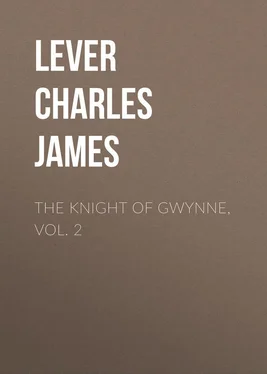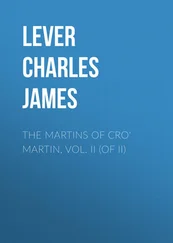Charles Lever - The Knight Of Gwynne, Vol. 2
Здесь есть возможность читать онлайн «Charles Lever - The Knight Of Gwynne, Vol. 2» — ознакомительный отрывок электронной книги совершенно бесплатно, а после прочтения отрывка купить полную версию. В некоторых случаях можно слушать аудио, скачать через торрент в формате fb2 и присутствует краткое содержание. Жанр: foreign_antique, foreign_prose, на английском языке. Описание произведения, (предисловие) а так же отзывы посетителей доступны на портале библиотеки ЛибКат.
- Название:The Knight Of Gwynne, Vol. 2
- Автор:
- Жанр:
- Год:неизвестен
- ISBN:нет данных
- Рейтинг книги:4 / 5. Голосов: 1
-
Избранное:Добавить в избранное
- Отзывы:
-
Ваша оценка:
- 80
- 1
- 2
- 3
- 4
- 5
The Knight Of Gwynne, Vol. 2: краткое содержание, описание и аннотация
Предлагаем к чтению аннотацию, описание, краткое содержание или предисловие (зависит от того, что написал сам автор книги «The Knight Of Gwynne, Vol. 2»). Если вы не нашли необходимую информацию о книге — напишите в комментариях, мы постараемся отыскать её.
The Knight Of Gwynne, Vol. 2 — читать онлайн ознакомительный отрывок
Ниже представлен текст книги, разбитый по страницам. Система сохранения места последней прочитанной страницы, позволяет с удобством читать онлайн бесплатно книгу «The Knight Of Gwynne, Vol. 2», без необходимости каждый раз заново искать на чём Вы остановились. Поставьте закладку, и сможете в любой момент перейти на страницу, на которой закончили чтение.
Интервал:
Закладка:
“He’s going to do it, now.”
Heffernan made no answer, but, leaning forward on the rail, settled himself to listen attentively to the speaker.
“Gentlemen of the jury,” said O’Halloran, in a low and deliberate tone, “if the only question I was interested in bringing before you this day was the cause you sit there to try, I would conclude here. Assured as I feel what your verdict will and must be, I would not add a word more, nor weaken the honest merit of your convictions by anything like an appeal to your feelings. But I cannot do this. The law of the land, in the plenitude of its liberty, throws wide the door of justice, that all may enter and seek redress for wrong, and with such evident anxiety that he who believes himself aggrieved should find no obstacle to his right, and that even he who frivolously and maliciously advances a charge against another suffers no heavier penalty for his offence than the costs of the suit. No, my Lords, for the valuable moments lost in a vexatious cause, for the public time consumed, for insult and outrage cast upon the immutable principles of right and wrong, you have nothing more severe to inflict than the costs of the action! – a pecuniary fine, seldom a heavy one, and not unfrequently to be levied upon insolvency! What encouragement to the spirit of revengeful litigation! How suggestive of injury is the system! How deplorable would it be if the temple could not be opened without the risk of its altar being desecrated! But, happily, there is a remedy – a great and noble remedy – for an evil like this. The same glorious institutions that have built up for our protection the bulwark of the law, have created another barrier against wrong, – grander, more expansive, and more enduring still; one neither founded on the variable basis of nationality or of language, nor propped by the artifices of learned, or the subtleties of crafty men; not following the changeful fortunes of a political condition, or tempered by the tone of the judgment-seat, but of all lands, of every tongue and nation and people, great, enduring, and immutable, – the law of Public Opinion. To the bar of this judgment-seat, one higher and greater than even your Lordships, I would now summon the plaintiff in this action. There is no need that I should detail the charge against him; the accusation he has brought this day is our indictment, – his allegation is his crime.”
The reader, by this time, may partake of Mr. Heffernan’s prescience, and divine what the secret intelligence between the Counsellor and Beecham portended, and that a long-meditated attack on the Knight of Gwynne, in all the relations of his public and private life, was the chief duty of Mr. O’Halloran in the action. Taking a lesson from the great and illustrious chief of a neighboring state, O’Reilly felt that Usurpation can never be successful till Legitimacy becomes odious. The “prestige” of the “old family” clung too powerfully to every class in the county to make his succession respected. His low origin was too recent, his moneyed dealings too notorious, to gain him acceptance, except on the ruins of the Darcys. The new edifice of his own fame must be erected out of the scattered and broken materials of his rival’s house. If any one was well calculated to assist in such an emergency, it was O’Halloran.
It was by – to use his own expression – “weeding the country of such men” that the field would be opened for that new class of politicians who were to issue their edicts in newspapers, and hold their parliaments in public meetings. Against exclusive or exaggerated loyalty the struggle would be violent, but not difficult; while against moderation, sound sense and character, the Counsellor well knew the victory was not so easy of attainment. He himself, therefore, had a direct personal object in this attack on the Knight of Gwynne, and gladly accepted the special retainer that secured his services.
By a series of artful devices, he so arranged his case that the Knight of Gwynne did not appear as an injured individual seeking redress against the collusive guilt of his agent and his tenantry, but as a ruined gambler, endeavoring to break the leases he had himself granted and guaranteed, and, by an act of perfidy, involve hundreds of innocent families in hopeless beggary. To the succor of these unprotected people Mr. Hickman O’Reilly was represented as coming forward, this noble act of devotion being the first pledge he had offered of what might be expected from him as the future leader of a great county.
He sketched with a masterly but diabolical ingenuity the whole career of the Knight, representing him at every stage of life as the pampered voluptuary seeking means for fresh enjoyment without a thought of the consequences; he exhibited him dispensing, not the graceful duties of hospitality, but the reckless waste of a tasteless household, to counterbalance by profusion the insolent hauteur of his wife, “that same Lady Eleanor who would not deign to associate with the wives and daughters of his neighbors!” “I know not,” cried the orator, “whether you were more crushed by his gold or by her insolence: it was time that you should weary of both. You took the wealth on trust, and the rank on guess, – what now remains of either?”
He drew a frightful picture of a suffering and poverty-enslaved tenantry, sinking fast into barbarism from hopelessness, – unhappily, no Irishman need depend upon his imagination for the sketch. He contrasted the hours of toil and sickness with the wanton spendthrift in his pleasures, – the gambler setting the fate of families on the die, reserving for his last hope the consolation that he might still betray those whom he had ruined, land that when he had dissipated the last shilling of his fortune, he still had the resource of putting his honor up to auction! “And who is there will deny that he did this?” cried O’Halloran. “Is there any man in the kingdom has not heard of his conduct in Parliament – that foul act of treachery which the justice of Heaven stigmatized by his ruin! How on the very night of the debate he was actually on his way to inflict the last wound upon his country, when the news came of his own overwhelming destruction! And, like as you have seen sometime in our unhappy land the hired informer transferred from the witness-table to the dock, this man stands now forth to answer for his own offences!
“It was full time that the rotten edifice of this feudalist gentry should fall; honor to you on whom the duty devolves to roll away the first stone!”
A slight movement in the crowd behind the bar disturbed the silence in which the Court listened to the speaker, and a murmur of disapprobation was heard, when a hand, stretched forth, threw a little slip of paper on the table before O’Halloran. It was addressed to him; and believing it came from the attorney in the cause, he paused to read it. Suddenly his features became of an ashy paleness, his lip trembled convulsively, and in a voice scarcely audible from emotion, he addressed the bench, —
“My Lords, I ask the protection of this Court. I implore your Lordships to see that an advocate, in the discharge of his duty, is not the mark of an assassin. I have just received this note – ” He attempted to read it, but after a pause of a second or two, unable to utter a word, he handed the paper to the bench.
The judge perused the paper, and immediately whispered an order that the writer, or at least the bearer, of the note should be taken into custody.
“You may rest assured, sir,” said the senior judge, addressing O’Halloran, “that we will punish the offender, if he be discovered, with the utmost penalty the law permits. Mr. Sheriff, let the court be searched.”
The sub-sheriff was already, with the aid of a strong police force, engaged in the effort to discover the individual who had thus dared to interfere with the administration of justice; but all in vain. The court and the galleries were searched without eliciting anything that could lead to detection; and although several were taken up on suspicion, they were immediately afterwards liberated on being recognized as persons well known and in repute. Meanwhile the business of the trial stood still, and O’Halloran, with his arms folded, and his brows bent in a sullen frown, sat without speaking, or noticing any one around him.
Читать дальшеИнтервал:
Закладка:
Похожие книги на «The Knight Of Gwynne, Vol. 2»
Представляем Вашему вниманию похожие книги на «The Knight Of Gwynne, Vol. 2» списком для выбора. Мы отобрали схожую по названию и смыслу литературу в надежде предоставить читателям больше вариантов отыскать новые, интересные, ещё непрочитанные произведения.
Обсуждение, отзывы о книге «The Knight Of Gwynne, Vol. 2» и просто собственные мнения читателей. Оставьте ваши комментарии, напишите, что Вы думаете о произведении, его смысле или главных героях. Укажите что конкретно понравилось, а что нет, и почему Вы так считаете.












